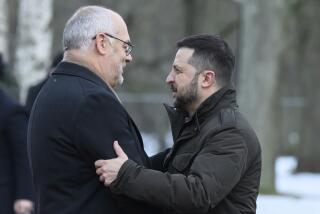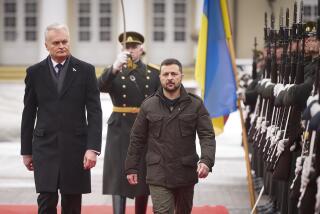Yeltsin Lays Shoot-Outs to Drift From Reform : Soviets: Russian president says he will use the resources of his republic to thwart totalitarianism.
MOSCOW — Russian Federation President Boris N. Yeltsin, siding with the rebellious Baltic republics in their tense battle with the Kremlin, Monday accused Soviet President Mikhail S. Gorbachev of moving the country so far off its reformist course that Moscow and republican forces are now shooting it out on the streets.
Yeltsin pledged that he would use the power and the resources of Russia, the Soviet Union’s largest republic, to prevent the country from returning to its old-style totalitarian system.
“Today, the reactionary forces in the Soviet leadership are allowed to do things that they could not do for a long time,” Yeltsin said. “The principles of democratization, glasnost and strict legality are obviously being abandoned.”
Yeltsin was speaking the morning after five people were killed and 10 wounded as Soviet commandos fought their way into the Latvian Interior Ministry headquarters in central Riga, the republic’s capital. Two policemen and three civilians, one of them a television cameraman, died in the fierce exchange of fire.
The gunfight in Riga occurred just a week after 13 Lithuanian nationalists and one soldier were killed as Soviet Interior Ministry troops stormed broadcast facilities in Vilnius, the Lithuanian capital.
The Russian-language Sodruzhestvo radio station in Riga reported that Sunday’s shoot-out may have been motivated by the gang rape of the wife of one of the officers of the elite “black beret” Soviet Interior Ministry troops.
The “black beret” troops seized Latvia’s newspaper publishing plant on Jan. 2 in one of the first acts of the central government’s toughest crackdown on the three Baltic republics. Last week, the troops shot to death a 39-year-old Latvian van driver near a large military base in suburban Riga.
Latvian Interior Minister Aloizs Vaznis told reporters that about 120 of the elite troops are under the command of the All-Latvian Public Salvation Committee, a shadowy group that claimed power in the republic last week. The group is led by Alfreds Rubiks, first secretary of the Latvian Communist Party and a member of the Soviet Communist Party’s Politburo.
In anticipation of more violence from the “black berets” or other pro-Kremlin troops, the pro-independence Latvian parliament voted in an early-morning session to create a volunteer self-defense force for the republic.
In Moscow, Anatoly A. Denisov, the chairman of the Soviet parliament’s Ethics Commission, said that Gorbachev may impose presidential rule on Latvia, which would take power away from the parliament and install administrators who would rule by decree.
“Extremist forces on both sides did everything to provoke the tragedy,” said Denisov, who led a seven-member delegation to Latvia last week to evaluate the situation there.
While Latvia and Lithuania have been battlegrounds in recent weeks in the Baltic republics’ fight for independence, the third Baltic republic, Estonia, has been more tranquil.
Arnold Ruutel, the Estonian president, met Gorbachev here on Monday and agreed to begin talks on that republic’s transition to independence.
Over the last 10 days, Yeltsin has emerged as a strong ally of the Baltic republics, repeatedly criticizing Gorbachev for supporting the brutality by not condemning it.
After Soviet troops stormed the television broadcast center in Vilnius, an outraged Yeltsin appealed to Russian men serving in the Soviet army not to follow orders to attack peaceful civilians.
When speaking to the Russian Supreme Soviet Monday, Yeltsin strongly reproached Gorbachev, the KGB security police and the army for supporting groups like the National Salvation Committee in Vilnius and the Public Salvation Committee in Riga. The groups, formed by loyalists of the Soviet Communist Party, are said to be behind the bloody attacks in both cities.
“An overthrow of the constitutional organs has practically begun, and the so-called National Salvation committees are striving to replace them,” Yeltsin told legislators. “The Soviet leadership took the position on this issue of supporting an anti-constitutional structure, not only with words but with deeds. KGB and armed units are practically at their disposal.”
Yeltsin indicated that, if Russian lawmakers do not do everything within their power to stop the violence in the Baltic republics, they could expect Soviet troops to try to undermine the legally elected Russian parliament as well as Yeltsin himself.
“If the national leadership sticks to this approach to the resolution of conflicts in the republics, if it keeps using armed forces in the republics, then we . . . should think about how we will defend Russia’s sovereignty,” an angry Yeltsin told the Supreme Soviet in a booming voice.
He then repeated a proposal to create a Russian army or national guard that would be loyal to him and not the Kremlin. Gorbachev fiercely attacked Yeltsin last week when he first proposed establishing a Russian armed force.
Yeltsin contended that for nearly six years Gorbachev and his team have vacillated between reforming the Soviet system and preserving it.
“In the end, they lack the resolve to choose the road toward reform,” he said. “The development of events shows that there has been a turn in the political course of the national leadership. The events in the Baltics are just one manifestation of that turn.”
More to Read
Sign up for Essential California
The most important California stories and recommendations in your inbox every morning.
You may occasionally receive promotional content from the Los Angeles Times.









